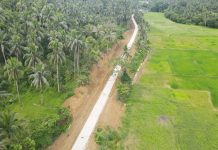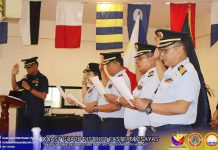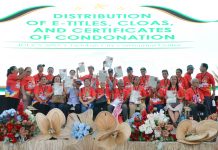TACLOBAN CITY- Nine months after supertyphoon Yolanda stunned the world due to its massive destruction caused to Eastern Visayas, the Climate Change Commission (CCC) launched a program aim to lessen, if not avoid, loss of lives during a disaster.
The program, dubbed as Resilience and Preparedness for Inclusive Development Program (RAPID), is to be undertaken in coordination with the Australian Aide Programme of the Australian government and the United Nations Development Program (UNDP) under Project Climate Change Twin Phoenix program. The two-year program, launched last August 18, is to be funded by the Australian government at Aus$4.3 million (about P170 million), said CCC Secretary Mary Ann Lucille Sering.
“This is a two-year program that would address on soft infrastructure that would lessen the impact of cost on the hard infrastructure when disaster strikes,” Sering said.
“We should plan for the worst scenario. We should be not even plan based on Yolanda. We should plan more than Yolanda and prepare for the worst scenario,” she added.
It will involve activities such as conduct of intensive vulnerability assessment, formulation and testing of local contingency plans and early warning systems, use of technologies in multi-hazard mapping to integrate climate and disaster risks into planning and improving coastal resource management. Sering said the project should be rapidly implemented and need the whole community and stakeholders’ commitment and action. She added that the rehabilitation was done based on the informed decisions citing that maps identifying hazards are already available, adding that RAPID will be clearer when asked if this will be a duplication of the ongoing rehabilitation programs of the government. Usec Lesley Cordero of the Office of the Presidential Assistant for Rehabilitation and Recovery (OPARR) said that it is more costly for the government to respond to disasters than to invest in preparedness.
“Through this RAPID Program, the local government units with the local actors should work towards disaster preparedness, resilience and strong sustainable development,” Cordero said. RAPID under the Project Climate Change Twin Phoenix program will roll-out in 12 identified local government units (LGUs) along San Pedro and San Pablo Bays in Eastern Visayas that were badly hit by Yolanda. These twelve LGUs were identified as most vulnerable to impact climate change such as sea level rise and extreme weather events such as storms and floods. The identified LGUs are the city of Tacloban, the municipalities of Palo, Tanauan, Tolosa, Mayorga, MacArthur, Dulag and Abuyog, all in Leyte; Balangiga and Lawaan of Eastern Samar and Marabut and Basey, both in Samar.
The program is designed to capacitate the local governments to come up with better planning, preparedness, establish policies and regulatory measures that will enable them to cope with disasters with increasing intensity as the new normal, and adapt to over-all impacts of climate change. Geoffrey King, Counselor, Australian Aid Programe-DFAT said that they are “proud” of the program adding that this could help save lives during a disaster.(VICKY C.ARNAIZ)



